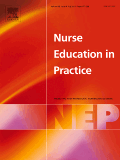
Nurse Education in Practice
Scope & Guideline
Empowering educators to elevate nursing curricula.
Introduction
Aims and Scopes
- Interprofessional Education and Collaboration:
Promoting collaborative learning and teamwork among nursing and other health profession students through interprofessional education initiatives. - Simulation-Based Learning:
Utilizing simulation as a teaching strategy to enhance clinical skills, decision-making, and professional competencies in nursing students. - Cultural Competence and Diversity:
Addressing the integration and support of culturally and linguistically diverse nursing students in healthcare education. - Digital Technology in Nursing Education:
Exploring the impact of digital tools, online learning environments, and technology integration in nursing curricula. - Mental Health and Wellbeing:
Investigating the mental health challenges faced by nursing students and the impact of educational interventions on their wellbeing. - Competency-Based Education:
Developing and validating frameworks and assessments to ensure nursing students meet the required competencies for practice. - Research and Evidence-Based Practice:
Fostering research engagement among nursing students and educators to promote evidence-based practice in clinical settings. - Educational Innovations and Pedagogical Strategies:
Examining innovative teaching methods and curricular designs that enhance learning outcomes and prepare students for real-world nursing challenges.
Trending and Emerging
- Mental Health Education and Support:
Increased focus on mental health education for nursing students, including strategies to address stress, anxiety, and resilience, reflecting the growing awareness of mental health issues in healthcare. - Use of Technology and Simulation:
A significant rise in the use of technology-enhanced learning methods, including virtual reality and simulation, to prepare nursing students for clinical practice. - Emphasis on Cultural Competence:
Growing attention to cultural competence and inclusivity in nursing curricula, aiming to better prepare students for diverse patient populations. - Interprofessional Education:
An increasing trend towards collaborative learning experiences that involve multiple health disciplines, promoting teamwork and comprehensive patient care. - Research Engagement and Evidence-Based Practice:
A notable rise in studies focusing on the integration of research activities into nursing education, emphasizing the importance of evidence-based practice. - Competency-Based Education Models:
A shift towards competency-based frameworks that define clear expectations for student performance and outcomes in nursing education. - Gamification and Innovative Learning Strategies:
Emerging interest in gamification and creative pedagogical strategies to enhance student engagement and learning outcomes. - Focus on Professional Identity Development:
Growing research on the development of professional identity among nursing students, emphasizing the importance of self-concept and professional values.
Declining or Waning
- Traditional Lecture-Based Teaching:
As the focus shifts towards more interactive and student-centered learning approaches, traditional lecture formats are being utilized less frequently. - Standalone Clinical Skills Workshops:
There is a waning interest in one-off skills workshops as holistic and integrated approaches to skill acquisition gain traction. - Focus on General Nursing Knowledge:
A decrease in publications centered solely on general nursing knowledge, with a shift towards specialized competencies and advanced practice areas. - Single-Dimensional Assessments:
The trend is moving away from traditional assessment methods towards more comprehensive and formative assessment strategies that capture a wider range of competencies. - Isolated Research on Specific Populations:
Research focusing solely on specific populations or issues without considering broader systemic factors is becoming less common.
Similar Journals
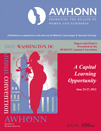
JOGNN-JOURNAL OF OBSTETRIC GYNECOLOGIC AND NEONATAL NURSING
Delivering critical research for improved patient outcomes.JOGNN - Journal of Obstetric Gynecologic and Neonatal Nursing, published by Elsevier Science Inc, is a leading peer-reviewed journal dedicated to advancing the field of nursing in obstetrics, gynecology, and neonatal care. With a ISSN of 0884-2175 and an E-ISSN of 1552-6909, the journal has established itself as a pivotal platform since its inception in 1972, showcasing rigorous research and innovative practices that greatly enhance patient care and nursing education. As evidenced by its 2023 impact factor and impressive Scopus rankings—ranking in the top quartile (Q1) in Critical Care Nursing, Maternity and Midwifery, and Pediatrics, and Q2 in Medicine—it provides invaluable insights for healthcare professionals, researchers, and students alike. The journal’s commitment to high-quality, evidence-based articles reflects its critical role in shaping contemporary nursing practices and informing best practices in maternal and neonatal health. While currently not an Open Access journal, the information disseminated through JOGNN remains vital for those striving to inform their practice and improve patient outcomes worldwide.

Nursing-Research and Reviews
Championing open access to enhance nursing excellence.Nursing-Research and Reviews is a prominent open-access journal published by DOVE MEDICAL PRESS LTD, dedicated to the dynamic field of nursing research. Since its inception in 2011, this journal has served as a vital platform for disseminating peer-reviewed articles, review papers, and original research that contribute to evidence-based nursing practice and education. With an ISSN of 2230-522X, it provides valuable insights into the latest developments and trends in nursing, aiming to bridge the gap between academia and clinical practice. The journal's commitment to open access ensures that its content is readily available to researchers, practitioners, and students worldwide, promoting a broader dissemination of knowledge. As part of a reputable publisher recognized for its focus on advancing medical and scientific understanding, Nursing-Research and Reviews plays a crucial role in shaping the future of nursing through innovative research and inclusive dialogue.
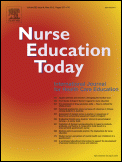
NURSE EDUCATION TODAY
Cultivating Knowledge and Innovation in Nursing Practice.NURSE EDUCATION TODAY is a prestigious academic journal dedicated to advancing the field of nursing education and practice. Published by Churchill Livingstone in the United Kingdom, this journal has been a vital resource since its inception in 1981, with a commitment to improving the standards and methodologies in nursing training. As evidenced by its impressive Q1 ranking in both Education and Nursing categories in 2023, and a remarkable 96th percentile ranking in Nursing (General Nursing), NURSE EDUCATION TODAY stands out as a leading source of evidence-based research, innovative educational strategies, and critical discussions that shape the future of nursing education. The journal provides a platform for researchers, practitioners, and educators to share their findings and experiences, making it essential reading for all stakeholders in the healthcare education landscape. Although it does not offer Open Access, its substantial impact on the nursing education community is significant, with ongoing contributions up to 2024 and beyond.
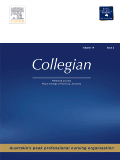
Collegian
Elevating Nursing Scholarship with Rigorous Insights.Collegian is a distinguished academic journal published by Elsevier, focusing on the dynamic field of nursing. Launched in 1994 and continuing through to 2024, it aims to contribute to the advancement of nursing knowledge and practice. With an ISSN of 1322-7696 and an E-ISSN of 1876-7575, this journal has achieved an impressive standing, securing a Q2 category ranking within Nursing (miscellaneous) and positioning itself at #49/139 in the general nursing category on Scopus, with a commendable 65th percentile. The journal provides a platform for both established researchers and emerging scholars to share innovative research, case studies, and reviews that shape nursing education and practice. Although not open access, it remains widely recognized for its rigorous peer-review process and substantial contributions to nursing literature. As the profession evolves, Collegian stands out as a pivotal resource for professionals, educators, and students who seek to enhance their understanding and application of nursing science.
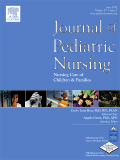
Journal of Pediatric Nursing-Nursing Care of Children & Families
Exploring the forefront of pediatric nursing advancements.The Journal of Pediatric Nursing - Nursing Care of Children & Families, published by Elsevier Science Inc, is a leading academic journal that focuses on the essential practices and advancements in pediatric nursing. With an ISSN of 0882-5963, this prestigious journal has been at the forefront of pediatric healthcare literature since its inception in 1986, offering critical insights and research findings that address the needs of children and families. Recognized in 2023 with a Q1 ranking in Pediatrics and ranked 6th out of 25 in the Scopus Nursing and Pediatrics category, it reflects its significance and impact in these fields. The journal prioritizes high-quality research that enhances nursing care practices, advocates for child and family-centered approaches, and promotes evidence-based guidelines. While the journal currently does not have an open access model, it remains a vital resource for researchers, practitioners, and students dedicated to improving pediatric health outcomes. With a commitment to scholarly excellence, the Journal of Pediatric Nursing continues to contribute to the evolving landscape of nursing care for children globally.
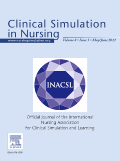
Clinical Simulation in Nursing
Transforming theory into practice with clinical simulation.Clinical Simulation in Nursing is a prestigious journal published by Elsevier Science Inc, focusing on advancing the field of nursing through innovative simulation-based education and research. With an impressive impact factor placing it in the Q1 quartile across multiple categories—including Education and Nursing—this journal is essential for professionals and scholars dedicated to enhancing nursing practice and training. Since its inception in 2006, Clinical Simulation in Nursing has gathered a commendable reputation for disseminating rigorous research and practical applications that bridge the gap between theoretical knowledge and clinical practice. The journal is indexed in prominent databases, ensuring high visibility and accessibility, while empowering educators, practitioners, and researchers alike to share insights that shape future nursing education paradigms. With a commitment to fostering excellence in simulation methodologies, this journal serves as a vital resource for anyone interested in the evolving landscape of nursing education and practice.

Journal of Korean Academy of Nursing
Advancing Nursing Excellence Through Research.The Journal of Korean Academy of Nursing, published by the Korean Society of Nursing Science, is a leading peer-reviewed journal dedicated to advancing the field of nursing research and practice. Established in 2008, this journal serves as a platform for innovative studies and discussions that address the challenges and developments in nursing. With an impressive 2023 category quartile ranking of Q2 in the field of Nursing and General Nursing, it ranks #58 out of 139 journals, placing it in the 58th percentile—a testament to its scholarly impact. Focused primarily on the nuances of nursing in South Korea and beyond, the journal fosters collaboration among various healthcare professionals and researchers, striving to improve nursing practices through empirical research and evidence-based insights. The journal is accessible to those seeking to engage with the latest findings and trends in nursing, further solidifying its role as an essential resource for researchers, practitioners, and students alike. For access and further details, please refer to the journal's homepage.

Nursing Reports
Transforming Patient Care with Innovative FindingsNursing Reports is a prominent open-access journal dedicated to disseminating scholarly research in the field of nursing and healthcare. Published by MDPI since 2020, the journal is based in Italy and features an ISSN of 2039-439X and an E-ISSN of 2039-4403. With rapid advancements in nursing practices and education, the journal serves as a vital platform for researchers, professionals, and students to share innovative findings and insights that enhance patient care and nursing methodologies. Recognized for its quality, the journal is ranked in the Q2 category in Nursing (Miscellaneous) for 2023, alongside a respectable position in the Scopus ranks, holding place #53 out of 139 in General Nursing, placing it in the 62nd percentile. The journal's commitment to fostering a collaborative research environment is underscored by its open-access model, allowing for unimpeded access to cutting-edge nursing research worldwide. As "Nursing Reports" continues to grow from its inception into its converged years spanning from 2014 to 2024, it plays a crucial role in the progression of the nursing profession and the overall healthcare landscape.
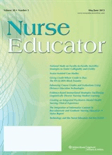
Nurse Educator
Catalyzing Change in Nursing through Comprehensive Research.Nurse Educator, published by Lippincott Williams & Wilkins, serves as a pivotal resource in the field of nursing education and practice. With an ISSN of 0363-3624 and an E-ISSN of 1538-9855, this esteemed journal has been contributing to the development of nursing professionals since 1976 and is recognized for its impactful articles, reflected in its 2023 Q2 category rankings across various nursing and educational domains. Nestled within the competitive landscape of academic publishing in the United States, its substantial Scopus ranking underscores its significance, particularly in Nursing Fundamentals and Skills (Rank #7/15) and general nursing fields (Rank #52/139). The journal's scope encompasses essential topics pertinent to nurse educators, including pedagogy, clinical practice, and exam preparation strategies, ultimately aiming to enhance nursing education and improve patient care outcomes. By providing an engaging platform for innovative research and best practices, Nurse Educator stands as an essential resource for researchers, educators, and students committed to advancing the nursing profession.
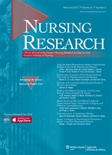
NURSING RESEARCH
Empowering nursing professionals with cutting-edge findings.Nursing Research, published by Lippincott Williams & Wilkins, is a prestigious academic journal dedicated to advancing the field of nursing through rigorous research and evidence-based practice. With an ISSN of 0029-6562 and an E-ISSN of 1538-9847, this journal has been a cornerstone of nursing scholarship since its inception in 1952. Currently ranked in the Q2 category for Medicine (miscellaneous) and in the Q1 category for Nursing (miscellaneous) as of 2023, Nursing Research is recognized for its high-quality contributions to the field and is ranked 38th out of 139 in General Nursing within Scopus. The journal offers essential insights and a forum for the latest research, enhancing clinical practices and informing policy decisions. Although it does not provide open access, it remains highly respected among researchers, professionals, and students alike, serving as an indispensable resource for those dedicated to improving patient care and advancing nursing science. For more information and to access articles, visit Nursing Research.